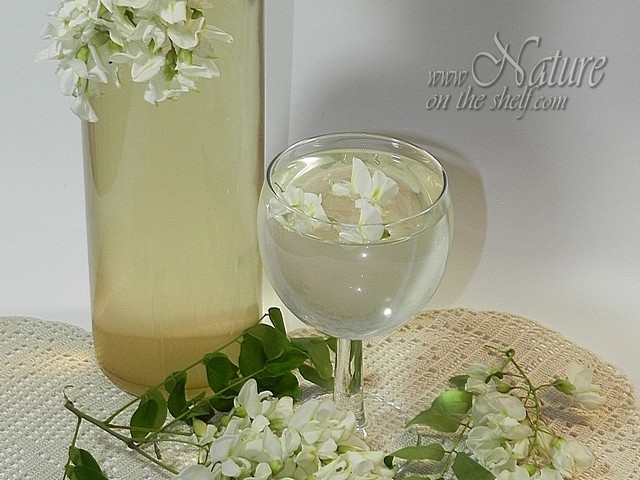Black locust flower syrup
Black locust (false acacia) flowers are an unusual choice to make a drink, but they give a surprisingly fragrant and refreshing soft drink, ideal for hot summer days. The scent of black locust flowers is intoxicating and it is amazing how easy it can be captured into sugar syrup.
The flowers which bloom in drooping clusters in black locust trees are edible and they can be used for making cordials, salads and sweet sauces or as a flavor for alcoholic drinks.
The making of black locust flower syrup (cordial, squash) is very similar to the making of elderflower cordial, and similarly, it can be used as a soft drink when diluted with 5-6 parts of water. It can also be used as a fragrant mixer for making other drinks like fruit juices or cocktails, as well as a dressing for sweet salads.
The scent of black locust flowers is more subtle compared to elderflowers, so recipes for black locust flower syrup usually call for using less sugar. As a result, it is not so sweet and more syrup can be used for dilution. This allows a stronger scent in the diluted drink.

Black locust flower syrup recipe
The basic ratio of ingredients for the black locust flower syrup is:
50-75 black locust flower clusters
1 kg (2.2 pounds) sugar
1 lit (1 quart) water
20g (4 tsp) citric acid
This will make 1,6 -1,7 lit (1.6-1.7 quarts) of syrup.
Also, you will need a heatproof pot to prepare sugar syrup and a cheesecloth to strain the cordial.
Bring water to boiling, add sugar and stir until it dissolves. You can, but it is not necessary, to let the syrup reach boiling. Turn the heat off and add citric acid. This will probably cause intense foaming for a few seconds, so be prepared for it and use a pot large enough to avoid mess on the stove. Let the syrup cool to room temperature.
Remove black locust flowers from main stems and let them sit in thin layer for 1-2 hours. This will give the small bugs hidden in the flowers a chance to evacuate.
When the sugar syrup is cool, pour flowers in it (or pour syrup over the flowers in another vessel) and mix well. As flowers contain captured air among petals, they will float on top of the syrup. Frequent stirring will allow flowers to soak, which is necessary to release their flavor into the syrup. Also, you can cover flowers with a plastic plate and put some weight to gently press them down.
Let the flowers steep in the syrup for 24 hours covered with a clean towel, and stir occasionally. Strain the cordial through the cheesecloth and squeeze it to extract as much cordial as possible. Pour the cordial in clean, dry, sterilized bottles and close the bottles tightly to prevent any contamination.
The cordial made in this way can be stored in the refrigerator or freezer (in that case, use plastic bottles). For storing at room temperature, it should be pasteurized, otherwise use food preservative.
